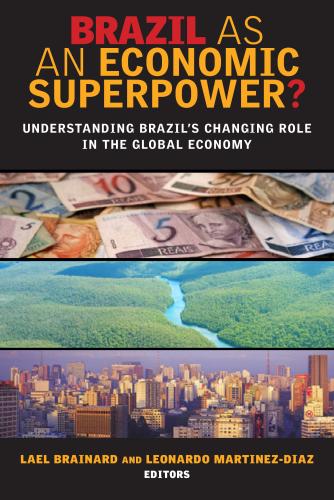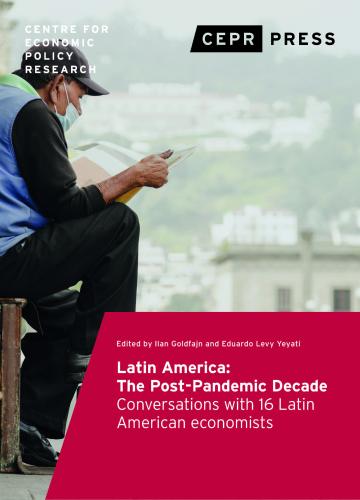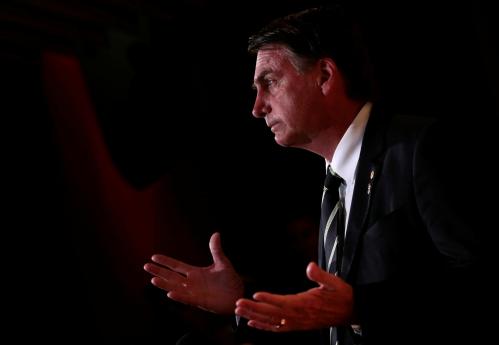On Sunday, October 2, Brazilians cast their votes in a presidential election that pairs two familiar faces in Brazilian politics: current Brazilian President Jair Bolsonaro, whose polarizing rhetoric, populist style, and penchant for yelling “fraud” have earned him the nickname the “Trump of the Tropics”; and Luiz Inácio Lula da Silva, known as Lula, who while serving as Brazil’s president for eight years implemented policies that significantly reduced poverty and inequality, was later jailed for alleged corruption, and has been described as the “most hated and loved man in Brazil.”
Each candidate offers a dramatically different vision for Brazil’s future, with opposing policies on topics ranging from the environment to foreign policy. Bolsonaro – who has a military background in a country governed by a military dictatorship for more than 20 years – has expressed contempt for democratic processes. Lula’s potential victory has been described as an opportunity to “rebuild Brazil’s battered democracy” after four years of flirtation with authoritarianism.
For weeks, polling showed Lula well ahead of Bolsonaro, with a chance to garner enough votes to avoid a runoff. But despite winning 5.2% more votes than his rival, Lula failed to pass the 50% threshold required to win in the first round. A second round of voting is scheduled for October 30, but for petistas – a term for Lula’s Worker’s Party (PT) supporters – the first-round results were sobering, as Bolsonaro allies won a number of key Senate races. Bolsonaro supporters also came out in force for the president, with his votes outpacing expectations. What happened to shift these results in favor of Bolsonaro? And what do the first-round results mean for the future of Brazil?
What happened in Brazil’s first round of elections
Although many factors contributed to Brazil’s first-round election results, what has become clear is that Bolsonaro supporters are more numerous than polling might suggest. Polling errors are common due to sampling challenges, but these can often be corrected through weighting and other statistical adjustments. Phone polls, for example, undercount less-wealthy voters — who tend to make up more of Lula’s coalition — due to low access to cell phones or landlines. In the case of Brazil’s elections, phone polls seemed to predict a closer election than in-person surveys, but they still may not have fully grasped the appeal of Bolsonaro’s candidacy.
Other factors might also be at play, including: (1) Bolsonaro and his supporters have made their disdain for polling clear, and may be less inclined to respond to pollsters’ questions; (2) some voters may have practiced “strategic voting,” deciding at the last minute to shift their vote from a third candidate who was unlikely to win to Bolsonaro; (3) Bolsonaro’s efforts to draw lower-income voters to his coalition through massive spending timed to the election may have – at least somewhat – paid off; and (4) preference falsification among Bolsonaro voters might point to a so-called “shy Bolsonaro” voter, much like those hypothesized to exist amongst supporters of former U.S. president Donald Trump.
Despite a 29% approval rating and a difficult economic situation, many Brazilians still supported Bolsonaro’s reelection bid. According to recent research, one reason may be that Brazilian politics is largely driven by partisan and anti-partisan sentiment. Close alignment with parties is fluid, with 72% of voters in 2016 reporting that they felt close to “none of Brazil’s parties.” Instead, one of Brazil’s major “political identities” is an anti-partisan voting bloc. This includes voters who may not explicitly support Bolsonaro (who leads a very small party) but want to vote against the PT, which they perceive as too far to the left or corrupt. Lula has become synonymous with the PT, running as its presidential candidate in six of nine elections since 1989. Although Lula is highly energizing to the PT’s base, with some arguing that results would have been worse without him, he may also mobilize anti-partisans, who might otherwise have voted for a third party, cast a null or blank ballot, or stayed home.
Another reason the results may have been closer than expected is the incumbency advantage: among the most powerful predictors of winning a U.S. election. Former U.S. President Donald Trump faced many of the same criticisms as Bolsonaro and eventually lost the 2020 presidential election – but he did so while garnering a record number of votes, despite a highly polarizing personality, poor pandemic response, and dismal economic conditions. In Brazil, historical precedent also points toward a difficult path for any candidate challenging a current president. Since 1994, no Brazilian incumbent running for reelection has ever lost. Although a wave of anti-incumbent sentiment swept through Latin America this past year and substantial controversies surrounded Bolsonaro and his policies, this historical precedent stubbornly persists.
Looking forward to the second round
Concerns about the parallel trajectory of Brazilian and U.S. politics are not unfounded. For years, Bolsonaro has laid groundwork to contest election results. Drawing inspiration from the 2020 U.S. election, which Bolsonaro claims was stolen from Trump, he has repeatedly asserted that the only way he loses in the first round is if “something abnormal” occurs. The U.S. far right has openly embraced Bolsonaro and his unfounded fraud claims, even as domestic and international onlookers have condemned them. Steven Bannon, Trump’s former advisor and one of the most prolific spreaders of the “big lie” that led to violence at the U.S. Capitol on January 6 2021, has repeatedly made overtures to Bolsonaro. In a recent episode of his podcast, Bannon echoed Bolsonaro’s critiques of Brazilian voting machines and claimed that Brazil’s Supreme Court was “at war” with Bolsonaro and would “under no circumstances” let him win. Other Trump allies, like Jason Miller, who served under the former president, and Tucker Carlson, a Fox News pundit known for embracing conspiracy theories and authoritarian leaders, have also recently travelled to Brazil to meet with Bolsonaro.
Bolsonaro’s concern about election security revolves around Brazil’s electronic voting machines, which have been in operation since 1996. These electronic voting machines, which are not connected to the internet, allow voters to verify their identification and cast their vote electronically. The machines tabulate and submit results to a central office shortly after voting closes, with a public tally posted online and at polling stations. Without evidence, Bolsonaro’s criticism of this system stems from the baseless belief that it is prone to hacking, vote switching, or tabulation errors. Brazil’s Superior Electoral Court has devoted significant attention to rebutting these claims and regularly conducts routine checks to safeguard the machines’ security. Recently, an international team led by the Carter Center observed integrity tests at three sites around Brazil and found no issues.
Thus far, social media has played a less prominent role fomenting election-related misinformation than it did in the 2018 election, due to a range of policies implemented in consultation with election officials. However, close elections create an opening for false claims, which have already begun to circulate online. On Facebook, popular posts by Bolsonaro’s supporters question the “incongruence” between the results of other contests – which saw many Bolsonaro allies win their elections – and the presidential election, and claim that voting machines just “didn’t give a signal” when they went to vote for the incumbent president. Elsewhere, claims that “satanists” support Lula have forced the PT candidate to release a statement that he is a Christian and has not made a “pact with the devil.” These posts – which garnered 3.5 million engagements and views just a day after they were shared online – are among the most popular on Facebook, but they are difficult for researchers to systematically track, as Meta’s CrowdTangle tool does not provide captions for video content in its data.
Because many of Bolsonaro’s allies did win in the first round, it will be harder to selectively claim fraud, without casting doubt on the entire electoral process – including contests that swung in Bolsonaro’s favor. But as we have seen in the United States, logical consistency may matter little in the presence of confirmation bias, whereby individuals seek out explanations that rationalize their beliefs and dismiss that which contradicts them. From a Google Trends search, a spike in interest about election fraud emerged a few days prior to the first round and will likely only continue to grow. With nearly two-thirds of Brazilians relying on social media for news, online platforms will likely play a pivotal role in the coming weeks.

Brazilian institutions have had years to prepare for a January 6 moment. They have mostly remained resilient, with the judiciary playing a leading and occasionally heavy-handed role in preserving democratic norms. But these institutions are still relatively young, and political violence is becoming more common across Brazil. Although Lula is still favored to win in the second round, if Bolsonaro concedes, governing will be exceedingly difficult. In the first round, Bolsonaro allies have already claimed two additional seats in the Senate and 22 additional seats in the Chamber of Deputies. Even if Bolsonaro formally leaves Planalto in early 2023, it is clear that – much like Trumpism, which has so far outlasted Trump’s time in office – bolsonarismo is here to stay.









Commentary
Will Brazil’s elections be a victory for democracy?
October 7, 2022